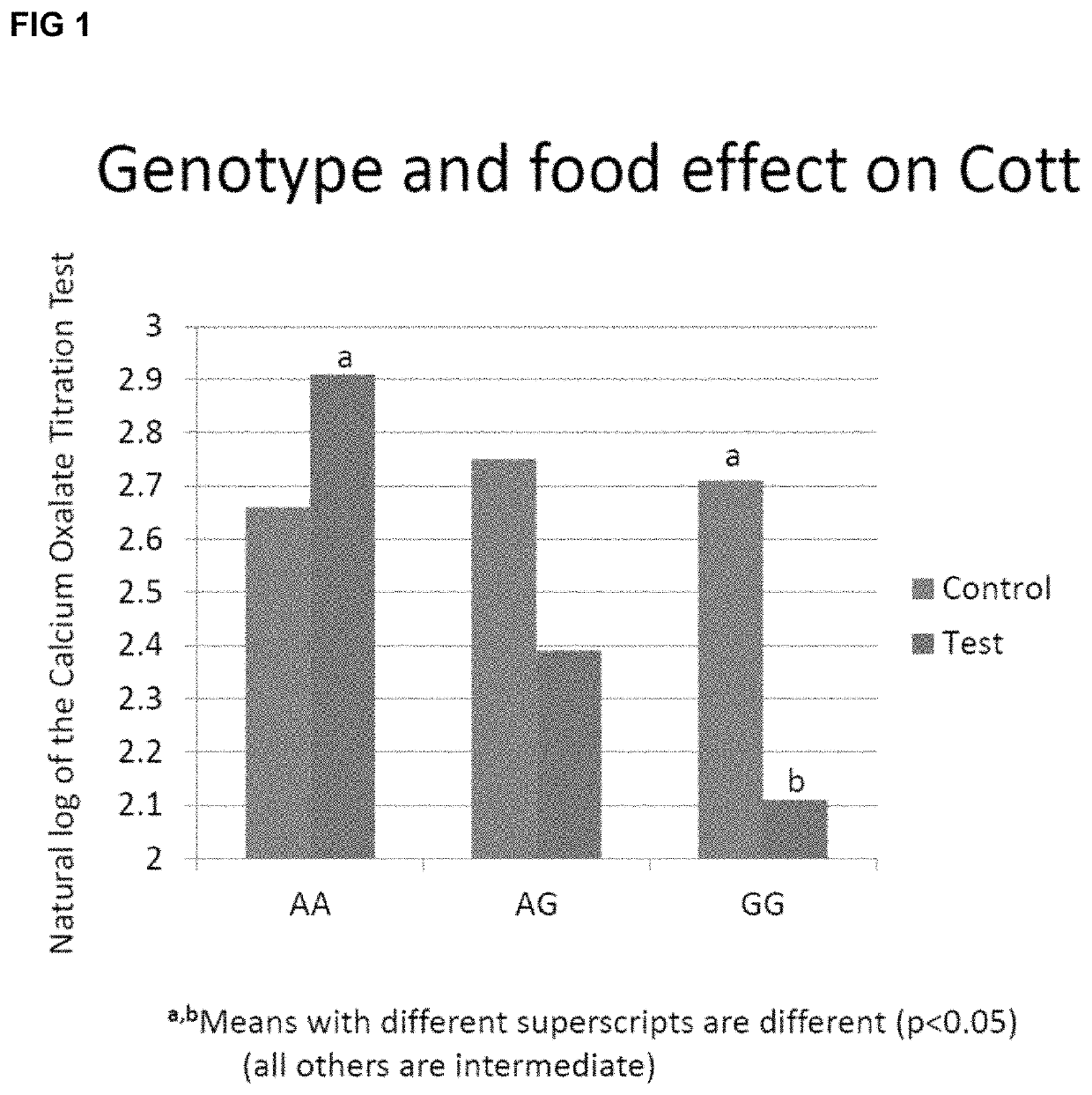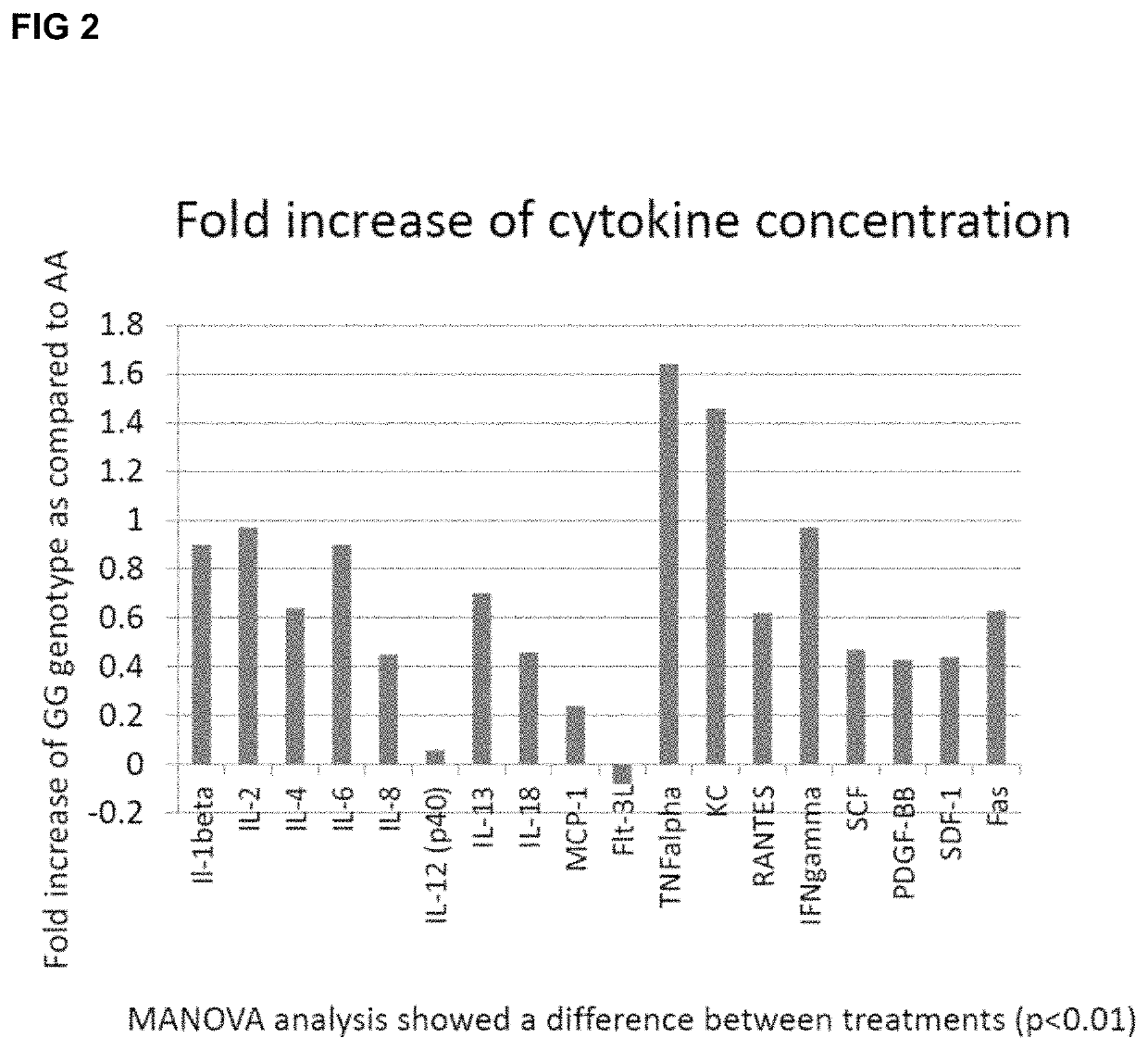Methods for identifying a companion animal susceptible to treatment that reduces the risk of stone formation and compositions for reducing such risk
a technology for identifying companion animals and reducing the risk of stone formation, which is applied in the direction of biochemistry apparatus and processes, plant/algae/fungi/lichens ingredients, instruments, etc., can solve the problems of increasing the risk of calcium oxalate stones, increasing the risk of struvite bladder stones, and putting cats at increased risk of calcium oxalate stones, so as to reduce the risk of calcium oxalate stone formation and reduce the risk of calcium oxala
- Summary
- Abstract
- Description
- Claims
- Application Information
AI Technical Summary
Benefits of technology
Problems solved by technology
Method used
Image
Examples
example 1
[0126]A genome wide association study of a cohort of 445 cats was undertaken. Each of the 445 cats of the cohort was genotyped for the chromosome 1 SNP A1_212891692. The cats were divided into three groups based upon whether the genotype of the cat was homozygous minor allele AA (GROUP 11), heterozygous allele AG (GROUP 12) or homozygous major allele GG (GROUP 22). The frequency of each genotype in the cohort was calculated based upon the number of cats with each of the three genotypes. The level of metabolite 2-oxoarginine was measured for each cat and the mean level of metabolite 2-oxoarginine was determined for each cohort. Table 1 provides overview of study and data generated.
[0127]
TABLE 1GROUPGROUP GROUP SNPVALUE111222A1_212069607GenotypeA / AA / GG / GA1_212069607Number of animals30169230with genotypeA1_212069607Frequency of genotype0.06990.39390.5361in cohortA1_212069607Mean level of0.44920.92391.2672-oxoarginine
[0128]As shown in Table 1, of the 445 cats genotyped, about 7% (0.0699...
example 2
[0129]A study was undertaken using 23 cats having various genotypes of the SNP A1_212891692 polymorphism. Nine cats had the AA genotype, four had the AG genotype and ten had the GG genotype.
[0130]Struvite stone risk analysis was completed on urinary samples by struvite relative super saturation (sRSS) assay. Calcium oxalate stone risk analysis was completed on urinary samples using COTT assay. Concurrently, urine was analyzed for relative sRSS using the EQUIL 2 program. In brief, this computer program calculates a urine supersaturation ratio (unitless) with respect to the common kidney stone components. The EQUIL 2 program provides an evaluation of the state of urinary saturation based on pH and total concentrations (M / L) of specific analytes.
[0131]Metabolomic analysis was completed by Metabolon® and scaled imputed data was used to compare specific genotypes. Sodium, potassium, calcium, magnesium, chloride, ammonium, citrate, phosphate, sulfate, and oxalate concentrations were measu...
example 3
[0134]The interaction of the SNP A1_212891692 polymorphism and nutrition on calcium oxalate stone formation risk was evaluated using 23 cats. Calcium oxalate stone formation risk was measured using the COTT assay. In brief, the [Ca+2] / (added Ox-2) ratio is calculated (per liter). An increasing index value denotes samples at greater risk of calcium oxalate crystallization, whereas decreasing index values denotes those with less risk. The ratio represents the concentration of ionized calcium and the amount of oxalate that is added to initiate crystallization. Results from the COTT assay are predictive for incidence of calcium oxalate stone formation. A treatment that can lower COTT assay results indicates an effective treatment to reduce the likelihood of calcium oxalate stone formation. Data was also collected from sRSS assay to determine any effect on risk of struvite stone formation.
[0135]Calcium oxalate stone risk was evaluated to determine the effect of dietary inclusion of betai...
PUM
| Property | Measurement | Unit |
|---|---|---|
| specific gravity | aaaaa | aaaaa |
| specific gravity | aaaaa | aaaaa |
| temperatures | aaaaa | aaaaa |
Abstract
Description
Claims
Application Information
 Login to View More
Login to View More - R&D
- Intellectual Property
- Life Sciences
- Materials
- Tech Scout
- Unparalleled Data Quality
- Higher Quality Content
- 60% Fewer Hallucinations
Browse by: Latest US Patents, China's latest patents, Technical Efficacy Thesaurus, Application Domain, Technology Topic, Popular Technical Reports.
© 2025 PatSnap. All rights reserved.Legal|Privacy policy|Modern Slavery Act Transparency Statement|Sitemap|About US| Contact US: help@patsnap.com


